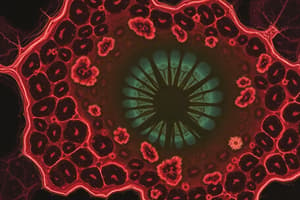Podcast
Questions and Answers
Which of the following statements accurately represents the cell theory?
Which of the following statements accurately represents the cell theory?
- All cells originate from pre-existing cells through division. (correct)
- Cells are the fundamental units of life, but they can spontaneously generate from non-living matter.
- The cell theory applies only to plant cells and not to animal cells.
- Cells are only found in multicellular organisms and are not present in single-celled organisms.
What was the primary contribution of Robert Hooke to the field of cytology?
What was the primary contribution of Robert Hooke to the field of cytology?
- He introduced the term 'cell' after observing dead cork cells under a microscope. (correct)
- He established cytology as a separate branch of biology.
- He formulated the cell theory.
- He discovered the existence of living cells.
Which scientist's work marked the establishment of cytology as a separate branch of biology?
Which scientist's work marked the establishment of cytology as a separate branch of biology?
- Matthias Schleiden
- Robert Hooke
- Oscar Hertwig (correct)
- Theodor Schwann
Which of the following statements is NOT true about the early development of cytology?
Which of the following statements is NOT true about the early development of cytology?
Which of the following statements accurately describes the significance of cytology?
Which of the following statements accurately describes the significance of cytology?
What did Walter Sutton and Theodor Boveri demonstrate the connection between?
What did Walter Sutton and Theodor Boveri demonstrate the connection between?
Which techniques do modern cytologists use to investigate cellular events?
Which techniques do modern cytologists use to investigate cellular events?
What insights has cytology provided into cellular structures, functions, and mechanisms?
What insights has cytology provided into cellular structures, functions, and mechanisms?
What did the research into the activities of chromosomes lead to the founding of in 1902–04?
What did the research into the activities of chromosomes lead to the founding of in 1902–04?
How has cytology contributed to the advancement of our understanding of life?
How has cytology contributed to the advancement of our understanding of life?
Study Notes
Introduction to Cytology
Cytology refers to the scientific discipline concerned with the study of cells as fundamental units of life. This field has its origins in the late 18th and early 19th centuries when advances in microscopy enabled scientists to observe these tiny structures for the first time. Since then, cytology has expanded significantly, providing valuable insights into cellular processes, structures, and functions.
Early Roots of Cytology
The earliest phase of cytology can be traced back to the English scientist Robert Hooke's microscopic investigations of cork in 1665. He observed dead cork cells and introduced the term "cell" to describe them. Despite his observations being limited to non-living cells, Hooke's work laid the groundwork for future research into living cells.
The Cell Theory
In the 19th century, two Germans, Matthias Schleiden (in 1838) and Theodor Schwann (in 1839), were among the first to clearly state that cells are the fundamental particles of both plants and animals. This idea, known as the cell theory, was later supported by Rudolf Virchow, who added that all cells come from the division of pre-existing cells.
Establishment of Cytology as a Separate Branch of Biology
Oscar Hertwig, a German embryologist and anatomist, suggested that organismic processes are reflections of cellular processes. This marked the establishment of cytology as a separate branch of biology.
Connection between Cell Division and Heredity: Cytogenetics
Research into the activities of chromosomes led to the founding of cytogenetics in 1902–04. American geneticist Walter Sutton and German zoologist Theodor Boveri demonstrated the connection between cell division and heredity, providing a basis for understanding how genetic information is passed down through generations.
Modern Cytology
Today, modern cytologists use various techniques borrowed from physics and chemistry to investigate cellular events. These include methods such as electron microscopy, immunocytochemistry, and molecular probes that allow researchers to visualize and study specific aspects of cells in great detail.
Conclusion
Cytology has played a crucial role in advancing our understanding of life at the most basic level – the cell. From the early observations of Hooke to the establishment of cell theory and the development of cytogenetics, this field has provided valuable insights into cellular structures, functions, and mechanisms. As technology continues to advance, cytology will undoubtedly continue to evolve, contributing new knowledge and tools for further exploration of the cellular world.
Studying That Suits You
Use AI to generate personalized quizzes and flashcards to suit your learning preferences.
Description
Explore the origins and key concepts of cytology, the scientific discipline dedicated to studying cells as the fundamental units of life. Learn about the early roots of cytology, the cell theory, cytogenetics, and modern techniques used in cellular research.




